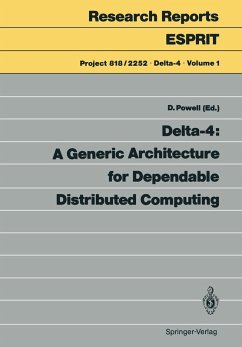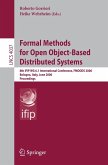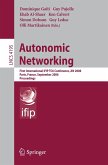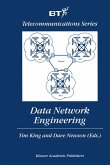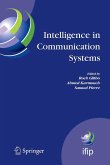Delta-4: A Generic Architecture for Dependable Distributed Computing (eBook, PDF)
Redaktion: Powell, David
40,95 €
40,95 €
inkl. MwSt.
Sofort per Download lieferbar

20 °P sammeln
40,95 €
Als Download kaufen

40,95 €
inkl. MwSt.
Sofort per Download lieferbar

20 °P sammeln
Jetzt verschenken
Alle Infos zum eBook verschenken
40,95 €
inkl. MwSt.
Sofort per Download lieferbar
Alle Infos zum eBook verschenken

20 °P sammeln
Delta-4: A Generic Architecture for Dependable Distributed Computing (eBook, PDF)
Redaktion: Powell, David
- Format: PDF
- Merkliste
- Auf die Merkliste
- Bewerten Bewerten
- Teilen
- Produkt teilen
- Produkterinnerung
- Produkterinnerung

Bitte loggen Sie sich zunächst in Ihr Kundenkonto ein oder registrieren Sie sich bei
bücher.de, um das eBook-Abo tolino select nutzen zu können.
Hier können Sie sich einloggen
Hier können Sie sich einloggen
Sie sind bereits eingeloggt. Klicken Sie auf 2. tolino select Abo, um fortzufahren.

Bitte loggen Sie sich zunächst in Ihr Kundenkonto ein oder registrieren Sie sich bei bücher.de, um das eBook-Abo tolino select nutzen zu können.
This book describes the design and validation of the Delta-4 distributed fault-tolerant architecture. The architecture features a dependable communication system using standard local area network technology, a distributed object-oriented application support environment, use of multicast or group communication protocols, and built-in support for user-transparent fault-tolerance.
- Geräte: PC
- ohne Kopierschutz
- eBook Hilfe
- Größe: 58.5MB
Andere Kunden interessierten sich auch für
![Formal Methods for Open Object-Based Distributed Systems (eBook, PDF) Formal Methods for Open Object-Based Distributed Systems (eBook, PDF)]() Formal Methods for Open Object-Based Distributed Systems (eBook, PDF)40,95 €
Formal Methods for Open Object-Based Distributed Systems (eBook, PDF)40,95 €![Networked Group Communication (eBook, PDF) Networked Group Communication (eBook, PDF)]() Networked Group Communication (eBook, PDF)40,95 €
Networked Group Communication (eBook, PDF)40,95 €![Autonomic Networking (eBook, PDF) Autonomic Networking (eBook, PDF)]() Autonomic Networking (eBook, PDF)40,95 €
Autonomic Networking (eBook, PDF)40,95 €![Modeling and Simulation Environment for Satellite and Terrestrial Communications Networks (eBook, PDF) Modeling and Simulation Environment for Satellite and Terrestrial Communications Networks (eBook, PDF)]() Modeling and Simulation Environment for Satellite and Terrestrial Communications Networks (eBook, PDF)72,95 €
Modeling and Simulation Environment for Satellite and Terrestrial Communications Networks (eBook, PDF)72,95 €![Data Network Engineering (eBook, PDF) Data Network Engineering (eBook, PDF)]() Data Network Engineering (eBook, PDF)112,95 €
Data Network Engineering (eBook, PDF)112,95 €![Integrated Network Management V (eBook, PDF) Integrated Network Management V (eBook, PDF)]() Integrated Network Management V (eBook, PDF)232,95 €
Integrated Network Management V (eBook, PDF)232,95 €![Intelligence in Communication Systems (eBook, PDF) Intelligence in Communication Systems (eBook, PDF)]() Intelligence in Communication Systems (eBook, PDF)72,95 €
Intelligence in Communication Systems (eBook, PDF)72,95 €-
-
-
This book describes the design and validation of the Delta-4 distributed fault-tolerant architecture. The architecture features a dependable communication system using standard local area network technology, a distributed object-oriented application support environment, use of multicast or group communication protocols, and built-in support for user-transparent fault-tolerance.
Dieser Download kann aus rechtlichen Gründen nur mit Rechnungsadresse in A, B, BG, CY, CZ, D, DK, EW, E, FIN, F, GR, HR, H, IRL, I, LT, L, LR, M, NL, PL, P, R, S, SLO, SK ausgeliefert werden.
Produktdetails
- Produktdetails
- Verlag: Springer Berlin Heidelberg
- Seitenzahl: 484
- Erscheinungstermin: 6. Dezember 2012
- Englisch
- ISBN-13: 9783642846960
- Artikelnr.: 53102121
- Verlag: Springer Berlin Heidelberg
- Seitenzahl: 484
- Erscheinungstermin: 6. Dezember 2012
- Englisch
- ISBN-13: 9783642846960
- Artikelnr.: 53102121
- Herstellerkennzeichnung Die Herstellerinformationen sind derzeit nicht verfügbar.
1. Requirements and Objectives.- 1.1. Fields of Application.- 1.2. Architectural Attributes.- 2. Overview of the Architecture.- 2.1. Dependability and Real-Time Concepts.- 2.2. Dependability and Real-Time in Delta-4.- 2.3. Architectural Sub-Systems.- 2.4. Software Environment and Management Issues.- 2.5. Validation.- 3. Comparison with other Approaches.- 3.1. Commercial Fault-Tolerance Techniques.- 3.2. Comparison of Approaches by Concept/Technique.- 3.3. Comparison of Approaches by Target System Characteristics.- 3.4. Case Studies.- 3.5. Conclusion.- 4. Dependability Concepts.- 4.1. Basic Definitions.- 4.2. On the Introduction of Dependability as a Generic Concept.- 4.3. On System Function, Behavior, Structure and Specification.- 4.4. The Impairments to Dependability.- 4.5. The Means for Dependability.- 4.6. The Attributes of Dependability.- 5. Real-Time Concepts.- 5.1. Concepts and Definitions.- 5.2. Delta-4 Approach to Real-Time.- 5.3. Real-Time Communications Protocols.- 5.4. Summary of Real-Time System Requirements.- 5.5. Conclusions.- 6. Distributed Fault-Tolerance.- 6.1. Related Work.- 6.2. Node Hardware Characteristics.- 6.3. Models of Distributed Computation.- 6.4. Replicated Software Components.- 6.5. Active Replication.- 6.6. Passive Replication.- 6.7. Semi-Active Replication.- 6.8. Group Management and Fault Treatment.- 6.9. Communications Support.- 6.10. Conclusion.- 7. Delta-4 Application Support Environment (Deltase).- 7.1. Purpose and Background.- 7.2. Computational Model.- 7.3. Engineering Model.- 7.4. Deltase Support for Distributed Fault-Tolerance.- 7.5. Engineering Support for Fault-Tolerance.- 7.6. Dependable Databases.- 8. Open System Architecture (OSA).- 8.1. Multipoint Communication System (MCS).- 8.2. System Administration.- 9. Extra PerformanceArchitecture (XPA).- 9.1. Objectives and Definitions.- 9.2. Overview.- 9.3. Real-time and Performance.- 9.4. Dependability and Computational Models.- 9.5. Support for Distributed Real-Time Computing.- 9.6. XPA as an Integrated Machine.- 9.7. System Administration.- 10. The Atomic Multicast protocol (AMp).- 10.1. Notions about Reliable Group Communication.- 10.2. Related Work.- 10.3. System Architecture.- 10.4. Summary of xAMp Services.- 10.5. The Abstract Network.- 10.6. Two-Phase Accept Protocol.- 10.7. Performance and Real-Time.- 10.8. Implementation Issues.- 11. Fail-Silent Hardware for Distributed Systems.- 11.1. Fail-Silent Node Models.- 11.2. A Comparative Evaluation.- 11.3. Concluding Remarks.- 12. Input/Output: Interfacing the Real World.- 12.1. Inter-working with non-Delta-4 systems.- 12.2. Inter-working with the Physical Environment.- 12.3. Summary.- 13. Security.- 13.1. Principles of Intrusion-Tolerance.- 13.2. Fragmentation-Scattering Applied to File Archiving.- 13.3. Intrusion-Tolerant Security Server.- 13.4. Selection and Implementation of an Authorization Policy.- 13.5. Future Extensions.- 14. Software-Fault Tolerance.- 14.1. A Brief History - the State of the Art.- 14.2. Software-Fault Tolerance for Delta-4.- 14.3. Support Mechanisms and Features.- 14.4. Specifying Software Components for Software-fault Tolerance - Tradeoffs in an Object Environment.- 14.5. Concluding Remarks.- 15. Validation.- 15.1. Overview.- 15.2. Protocol Validation.- 15.3. Fault Injection.- 15.4. Dependability Evaluation.- 15.5. Software Reliability.- Annexes.- A. Safety-Critical and Safety-Related Systems.- B. Deterministic UNIX.- C. Statistical Effects with Schedules of many Activities.- D. Assigning Precedence Parameters.- E. Formal Failure Mode Assumptions.- F. AssumptionCoverage.- G. Propagate-before-Validate Error Processing Technique.- H. Interface between XPA and OSA.- I. Timing Characteristics of Preemption Points.- J. Formal Presentation of AMp.- K. Models for the Representation of Reactive Systems.- L. Service Specifications.- M. Co-existence with non-Delta-4 Stations on the same LAN.- Glossary of Abbreviations.- References.- Author Affiliations.- The Delta-4 Consortium.
1. Requirements and Objectives.- 1.1. Fields of Application.- 1.2. Architectural Attributes.- 2. Overview of the Architecture.- 2.1. Dependability and Real-Time Concepts.- 2.2. Dependability and Real-Time in Delta-4.- 2.3. Architectural Sub-Systems.- 2.4. Software Environment and Management Issues.- 2.5. Validation.- 3. Comparison with other Approaches.- 3.1. Commercial Fault-Tolerance Techniques.- 3.2. Comparison of Approaches by Concept/Technique.- 3.3. Comparison of Approaches by Target System Characteristics.- 3.4. Case Studies.- 3.5. Conclusion.- 4. Dependability Concepts.- 4.1. Basic Definitions.- 4.2. On the Introduction of Dependability as a Generic Concept.- 4.3. On System Function, Behavior, Structure and Specification.- 4.4. The Impairments to Dependability.- 4.5. The Means for Dependability.- 4.6. The Attributes of Dependability.- 5. Real-Time Concepts.- 5.1. Concepts and Definitions.- 5.2. Delta-4 Approach to Real-Time.- 5.3. Real-Time Communications Protocols.- 5.4. Summary of Real-Time System Requirements.- 5.5. Conclusions.- 6. Distributed Fault-Tolerance.- 6.1. Related Work.- 6.2. Node Hardware Characteristics.- 6.3. Models of Distributed Computation.- 6.4. Replicated Software Components.- 6.5. Active Replication.- 6.6. Passive Replication.- 6.7. Semi-Active Replication.- 6.8. Group Management and Fault Treatment.- 6.9. Communications Support.- 6.10. Conclusion.- 7. Delta-4 Application Support Environment (Deltase).- 7.1. Purpose and Background.- 7.2. Computational Model.- 7.3. Engineering Model.- 7.4. Deltase Support for Distributed Fault-Tolerance.- 7.5. Engineering Support for Fault-Tolerance.- 7.6. Dependable Databases.- 8. Open System Architecture (OSA).- 8.1. Multipoint Communication System (MCS).- 8.2. System Administration.- 9. Extra PerformanceArchitecture (XPA).- 9.1. Objectives and Definitions.- 9.2. Overview.- 9.3. Real-time and Performance.- 9.4. Dependability and Computational Models.- 9.5. Support for Distributed Real-Time Computing.- 9.6. XPA as an Integrated Machine.- 9.7. System Administration.- 10. The Atomic Multicast protocol (AMp).- 10.1. Notions about Reliable Group Communication.- 10.2. Related Work.- 10.3. System Architecture.- 10.4. Summary of xAMp Services.- 10.5. The Abstract Network.- 10.6. Two-Phase Accept Protocol.- 10.7. Performance and Real-Time.- 10.8. Implementation Issues.- 11. Fail-Silent Hardware for Distributed Systems.- 11.1. Fail-Silent Node Models.- 11.2. A Comparative Evaluation.- 11.3. Concluding Remarks.- 12. Input/Output: Interfacing the Real World.- 12.1. Inter-working with non-Delta-4 systems.- 12.2. Inter-working with the Physical Environment.- 12.3. Summary.- 13. Security.- 13.1. Principles of Intrusion-Tolerance.- 13.2. Fragmentation-Scattering Applied to File Archiving.- 13.3. Intrusion-Tolerant Security Server.- 13.4. Selection and Implementation of an Authorization Policy.- 13.5. Future Extensions.- 14. Software-Fault Tolerance.- 14.1. A Brief History - the State of the Art.- 14.2. Software-Fault Tolerance for Delta-4.- 14.3. Support Mechanisms and Features.- 14.4. Specifying Software Components for Software-fault Tolerance - Tradeoffs in an Object Environment.- 14.5. Concluding Remarks.- 15. Validation.- 15.1. Overview.- 15.2. Protocol Validation.- 15.3. Fault Injection.- 15.4. Dependability Evaluation.- 15.5. Software Reliability.- Annexes.- A. Safety-Critical and Safety-Related Systems.- B. Deterministic UNIX.- C. Statistical Effects with Schedules of many Activities.- D. Assigning Precedence Parameters.- E. Formal Failure Mode Assumptions.- F. AssumptionCoverage.- G. Propagate-before-Validate Error Processing Technique.- H. Interface between XPA and OSA.- I. Timing Characteristics of Preemption Points.- J. Formal Presentation of AMp.- K. Models for the Representation of Reactive Systems.- L. Service Specifications.- M. Co-existence with non-Delta-4 Stations on the same LAN.- Glossary of Abbreviations.- References.- Author Affiliations.- The Delta-4 Consortium.
